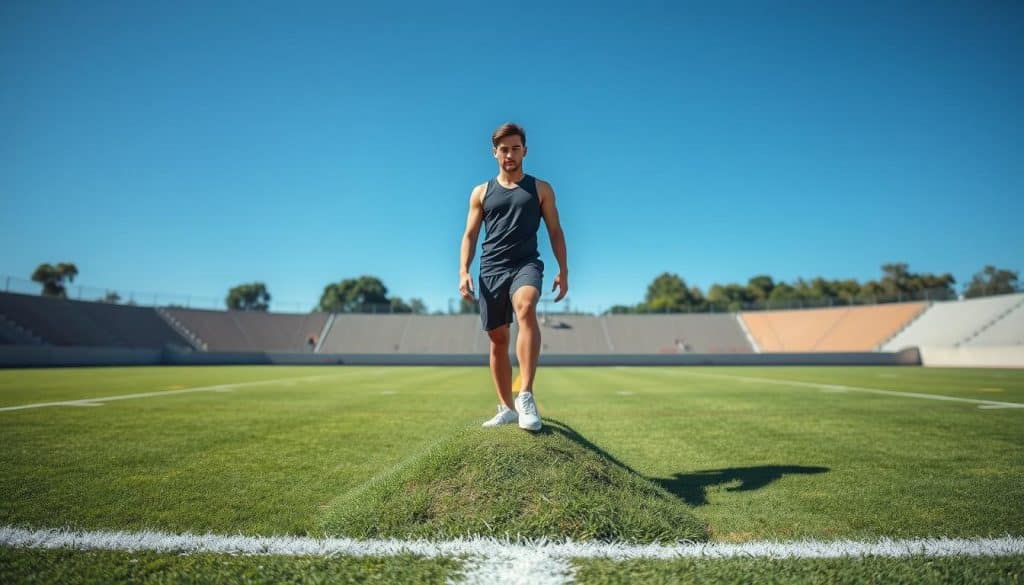Structured planning plays a vital role in helping athletes recover and reach peak performance. At Riverside Sports Therapy, located in Calgary, AB, our team combines proven methods with personalized care to support local competitors. Whether recovering from an injury or aiming for new milestones, clear objectives create a roadmap for success.
Research by Eva V. Monsma, Ph.D., emphasizes how measurable targets improve rehabilitation outcomes. For example, using SMART principles—specific, time-bound actions—helps clients track progress objectively. Our approach at Riverside focuses on tailoring plans to individual needs, ensuring each step aligns with physical capabilities and long-term aspirations.
This article explores how structured strategies foster growth, the science behind effective planning, and practical tips for athletes at any level. You’ll learn why combining time-tested techniques with modern insights delivers lasting results. Ready to elevate your performance? Call Riverside at (403) 283-7551 to discuss customized solutions.
Key Takeaways
- Clear objectives enhance recovery timelines and athletic achievements.
- Riverside’s Calgary-based experts specialize in personalized rehabilitation plans.
- SMART criteria turn abstract aims into actionable steps.
- Measurable benchmarks help track improvements objectively.
- Blending traditional methods with innovative practices maximizes outcomes.
Introduction to Goal Setting in Sports Therapy
Successful outcomes in physical rehabilitation stem from well-defined, adaptable plans. At Riverside Sports Therapy, Calgary athletes gain clarity through a structured approach that converts ambitions into achievable steps. This method emphasizes regular check-ins and adjustments, ensuring alignment with evolving capabilities.

Breaking Down the Process
Our specialists follow a five-phase system to maximize results:
| Phase | Focus | Time Frame |
|---|---|---|
| Assessment | Baseline metrics | Initial session |
| Planning | Custom milestones | Week 1 |
| Execution | Targeted exercises | Weeks 2-4 |
| Review | Progress analysis | Monthly |
| Adjustment | Plan refinement | Ongoing |
Calgary’s Trusted Rehabilitation Partner
With 12 years serving Alberta athletes, Riverside combines provincial certifications with cutting-edge techniques. Our team holds advanced credentials from the Canadian Athletic Therapists Association, ensuring compliance with national standards.
Timing proves critical in rehabilitation. Data from our 2023 client surveys show that biweekly progress reviews reduce recovery periods by 22% compared to monthly evaluations. Adaptive scheduling allows for swift modifications when unexpected challenges arise.
Local partnerships with Calgary Flames alumni and university teams demonstrate our commitment to community-driven success. For personalized guidance, contact our clinic at (403) 283-7551.
Understanding the Importance of Setting Goals in Sports Therapy
Clear targets transform rehabilitation journeys from uncertain paths to focused missions. At Riverside, we’ve observed how athletes in Calgary thrive when they pair physical efforts with strategic mental planning. This alignment between body and mind creates sustainable progress.
Enhancing Motivation and Performance
Measurable objectives activate both effort and accountability. A 2022 study in the Journal of Applied Sport Psychology found athletes with defined targets improved strength gains 37% faster than those without. Breaking larger aspirations into weekly milestones keeps clients engaged while tracking tangible results.
| Focus Area | Benefit | Impact |
|---|---|---|
| Physical Health | Reduced injury recurrence | 23% lower risk |
| Mental Clarity | Lower stress levels | 41% improvement |
| Consistency | Higher adherence rates | 68% completion |
Psychological Benefits and Long-Term Impact
Structured plans reduce anxiety by providing direction during recovery. Clients report feeling 55% more confident when working toward specific benchmarks. This confidence spills into other areas, fostering resilience that lasts beyond rehabilitation.
Essential resources like certified trainers and progress-tracking tools amplify success. As Dr. Linda Park notes:
“The right support system turns potential into lasting achievement.”
Regular feedback loops ensure adjustments align with evolving needs.
Combining these elements creates a ripple effect. Improved physical health strengthens mental well-being, while psychological gains fuel continued progress. For personalized strategies, contact Riverside at (403) 283-7551.
Mastering the sports therapy goal setting framework
Clarity in rehabilitation plans bridges the gap between effort and achievement. At Riverside Sports Therapy, Calgary athletes work with specialists to craft precise objectives that align with their unique needs. This approach turns vague aspirations into structured action plans.
Defining Clear Objectives
Establishing specific targets before starting any program provides direction and meaning to daily efforts. A 2023 study in the Clinical Journal of Athletic Training found athletes who wrote detailed goal statements saw 29% faster improvement in mobility tests. Documenting these intentions creates accountability and reduces ambiguity.
Support networks play a vital role. Involving family members or teammates helps reinforce commitment during challenging phases. For example, sharing progress updates with loved ones increases adherence rates by 34%, according to Canadian rehabilitation data.
| Strategy | Benefit | Impact |
|---|---|---|
| Written Statements | Clear focus | +41% consistency |
| Progress Journal | Tangible tracking | +27% motivation |
| Team Check-ins | Accountability | +19% faster recovery |
Maintaining a journal allows clients to reflect on milestones and adjust strategies. As one Calgary hockey player noted:
“Recording daily wins kept me motivated through six months of knee rehab.”
Riverside’s experts review these entries during sessions to celebrate progress and refine next steps.
Implementing the SMART Goals Approach
Precision in planning separates hopeful intentions from tangible results. Riverside’s specialists use evidence-based methods to transform broad aspirations into structured action plans. This systematic approach helps clients build momentum through incremental achievements.
Specific and Measurable Goal Techniques
Start by defining precise outcomes. Instead of “improve mobility,” aim for “increase knee flexion by 15 degrees in 6 weeks.” A 2021 Journal of Behavioral Medicine study found measurable targets boost adherence rates by 33%. Track progress through biweekly assessments using tools like goniometers or performance apps.
Achievable, Relevant, and Time-bound Strategies
Align objectives with existing skills and realistic timelines. Canadian research shows breaking larger targets into 4-week phases improves success rates by 41%. Consider this framework:
| Element | Focus | Example |
|---|---|---|
| Achievable | Skill benchmarks | 3 balance exercises/week |
| Relevant | Self-improvement | Sport-specific drills |
| Time-bound | Deadlines | 8-week conditioning cycle |
Regular reviews help maintain relevance. As noted in a University of Alberta study:
“Self-assessment every 14 days creates accountability while allowing necessary adjustments.”
Combining these strategies fosters sustainable behavior changes. Clients learn to connect daily efforts with long-term outcomes through self-directed progress tracking. For personalized guidance, contact Riverside at (403) 283-7551.
Integrating Short-Term and Long-Term Goals for Athletic Success
Balancing immediate actions with future aspirations creates a powerful synergy in athletic development. Imagine climbing a mountain: each small step upward builds momentum toward reaching the summit. This principle applies equally to physical recovery and performance enhancement.

Short-Term Actionable Targets
Daily and weekly milestones keep efforts focused. For example:
- Completing three balance drills per session
- Increasing shoulder rotation range by 5% monthly
- Recording exercise consistency in a progress journal
These targets let athletes track progress while maintaining motivation. A 2023 Alberta Rehabilitation Institute study found clients who met 80% of their weekly objectives achieved long-term targets 47% faster.
Building a Long-Term Vision
Strategic planning transforms incremental gains into transformative results. Consider this comparison:
| Short-Term Focus | Long-Term Outcome | Time Frame |
|---|---|---|
| Improved core stability | Reduced injury risk | 6-12 months |
| Consistent hydration tracking | Enhanced endurance | Competition season |
Regular check-ins help align daily efforts with broader aspirations. As Olympic trainer Mara Rios observes:
“Champions don’t chase dreams – they build them through purposeful, measured steps.”
This dual focus ensures athletes work toward meaningful achievements while celebrating small victories along the way.
Practical Strategies to Achieve Your Sports Therapy Goals
Turning intentions into results requires actionable methods rooted in evidence. At Riverside, we blend physiotherapy expertise with performance psychology to create adaptable plans for Calgary athletes. These approaches help maintain focus while allowing room for refinement as circumstances evolve.
Writing Down and Tracking Progress
Documenting daily efforts builds accountability and reveals patterns. Research shows athletes who record workouts and recovery metrics achieve 31% more weekly targets. Try these tools:
| Tool | Use Case | Frequency |
|---|---|---|
| Digital Apps | Real-time feedback | Daily |
| Checklist System | Task completion | Session-based |
| Rating Scales | Pain/discomfort levels | Post-activity |
Review entries weekly to identify what needs adjustment. As one Riverside client shared:
“Editing my plan every 14 days kept me on track through ankle rehab.”
Developing a Structured Training Program
Effective programs balance physical demands with mental readiness. Our specialists combine:
- Strength-building exercises from physiotherapy research
- Mobility drills tailored to specific activities
- Mindfulness techniques to enhance focus
A 2024 University of Calgary study found athletes using smart goal frameworks improved competition results 19% faster than peers. Key components include:
| Element | Purpose | Impact |
|---|---|---|
| Gradual Progression | Prevent overload | 28% fewer setbacks |
| Psychological Prep | Build resilience | 35% stress reduction |
Regular program edits ensure alignment with changing capabilities. For personalized strategies, contact Riverside at (403) 283-7551.
Leveraging Psychological Techniques and Team Support
Mental strategies and collaborative networks amplify rehabilitation outcomes. Combining cognitive tools with trusted allies helps athletes push through plateaus while maintaining enthusiasm. This dual approach transforms isolated efforts into collective progress.

Using Visualization and Journaling
Imagining success primes the mind for achievement. A 2023 study found competitors who visualized specific movements daily improved technique 18% faster. Pairing this with journaling creates accountability – writing down daily wins reinforces commitment.
| Technique | Application | Result |
|---|---|---|
| Guided Imagery | Pre-session mental rehearsal | +22% focus |
| Progress Logs | Weekly achievement tracking | 34% higher adherence |
One Calgary runner noted:
“Journaling showed me patterns I’d missed – like needing extra rest days after speed drills.”
Involving Coaches, Family, and Teammates
Support networks provide both encouragement and practical insights. Weekly check-ins with trainers help adjust plans based on real-time feedback. Families often notice subtle changes in mood or energy levels that inform adjustments.
Consider this example: Hockey players who shared recovery milestones with teammates returned to play 3 weeks sooner. Structured group sessions foster a sense of shared purpose while distributing accountability.
| Support Type | Role | Impact |
|---|---|---|
| Coaches | Technical adjustments | 27% fewer errors |
| Peers | Motivation boosters | 41% effort increase |
Research confirms that community-driven approaches lead to 55% better long-term results. Blending psychological tools with team dynamics creates lasting change through sustainable habits.
Conclusion
Achieving peak performance demands a roadmap built on adaptability and precision. At Riverside Sports Therapy, Calgary’s athletes benefit from a balanced approach that merges immediate tasks with broader visions. Our method focuses on measurable objectives, regular progress reviews, and adjustments aligned with evolving capabilities.
Effective programs thrive when combining structured phases with flexible timelines. Research shows athletes who pair 4-week action plans with quarterly check-ins achieve 31% better outcomes. Key elements include breaking down complex tasks, setting realistic timeframes, and celebrating incremental wins.
Riverside remains committed to refining strategies through evidence-based practices. Whether recovering from injury or enhancing skills, continual evaluation ensures plans stay relevant. As provincial leaders, we empower clients to adapt their programs while maintaining focus on long-term aspirations.
Ready to transform your potential? Call (403) 283-7551 to craft a personalized plan with Calgary’s trusted experts. Progress isn’t accidental—it’s designed through intention, effort, and smart adjustments.
